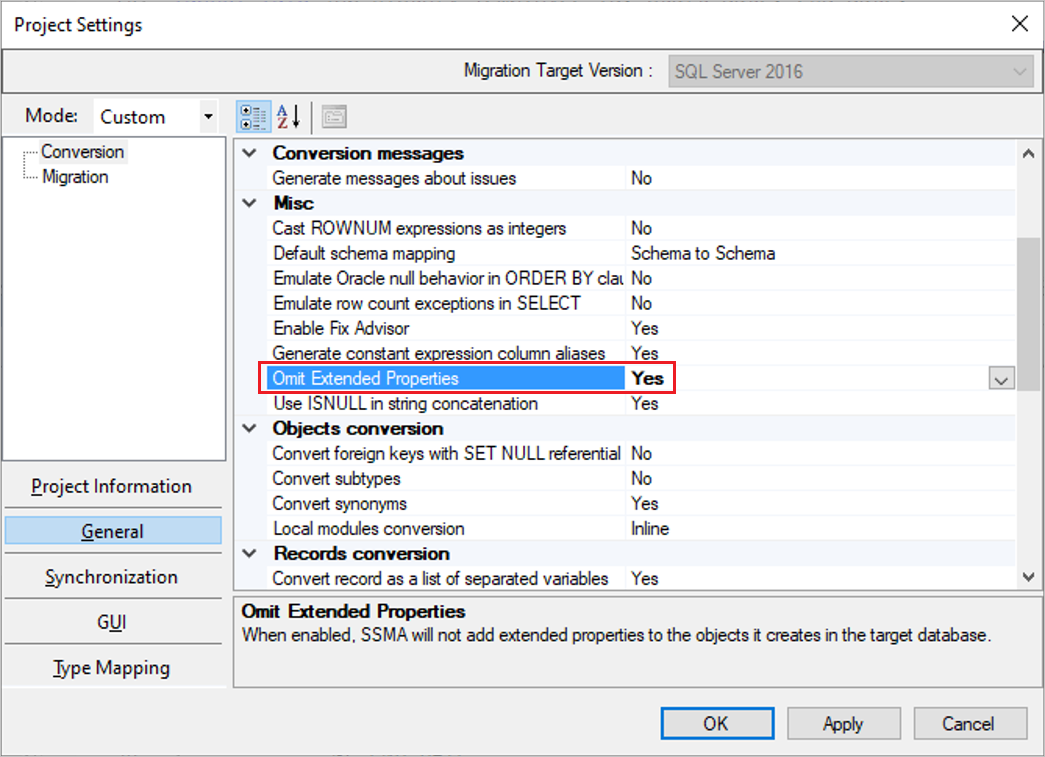Note
Access to this page requires authorization. You can try signing in or changing directories.
Access to this page requires authorization. You can try changing directories.
This article lists SQL Server Migration Assistant (SSMA) for Oracle changes in each release.
Note
While Microsoft Entra ID is the new name for Azure Active Directory (Azure AD), to prevent disrupting existing environments, Azure AD still remains in some hardcoded elements such as UI fields, connection providers, error codes, and cmdlets. In this article, the two names are interchangeable.
SSMA v10.2
The v10.2 release of SSMA for Oracle contains the following changes:
- AI-assisted code code conversion with Microsoft Copilot in SSMA for Oracle (Preview)
SSMA v10.1
The v10.1 release of SSMA for Oracle contains the following changes:
- Detection of CHAR length in Oracle VARCHAR2 datatype
- Enhanced monitoring experience for migrations using Azure Data Migration Service (DMS)
SSMA v10.0
The v10.0 release of SSMA for Oracle contains the following changes:
- Oracle data movement using Azure Data Migration service
- SKU recommendation and Workload assessment for Oracle workload
- Support for global Microsoft Entra ID authentication
SSMA v9.5
The v9.5 release of SSMA for Oracle contains the following changes:
- Support for exclude schema in SSMA console mode
SSMA v9.4
The v9.4 release of SSMA for Oracle contains the following changes:
- Add support for BULK COLLECT conversion using bulk emulation function to retrieve multiple rows in a single fetch.
- Fix for missing subscriptions in migration through migration at scale.
- Improve conversion of DECODE function.
- Improve conversion for comparison of empty strings with
NULL.
SSMA v9.3
The v9.3 release of SSMA for Oracle contains the following changes:
- Add support for SQL Server 2022 target
SSMA v9.2
The v9.2 release of SSMA for Oracle contains the following changes:
- Add Support for legacy Unicode string literals
- Add Support for arbitrary expressions in ESCAPE clause
- Conversion Support for EXTRACT(XML) and XMLQUERY
- Enhanced data pipeline monitoring for at scale migration
- Conversion Support for EXTRACT(XML), EXTRACTVALUE, and XMLQUERY
- Support for Azure Data Factory (ADF) pipeline monitoring
SSMA v9.1
The v9.1 release of SSMA for Oracle contains the following changes:
- Support for at scale data migration from Oracle to SQL with integration of Azure Data factory
- Add support for exclusion of system generated invisible column for conversion and data migration
- Improve get help experience
SSMA v9.0
The v9.0 release of SSMA for Oracle contains the following changes:
- Add support for VARRAY and TABLE user defined types at schema level
- Add support for conversion for arguments, parameter, and local declaration for user defined types
SSMA v8.24
The v8.24 release of SSMA for Oracle contains the following changes:
- Add support for LISTAGG function
- Add support for Oracle compound triggers
- Improve detection logic for JOIN clause and PIPELINED functions
- Improve naming for "Save As" statements
SSMA v8.23
The v8.23 release of SSMA for Oracle contains the following changes:
- Support for mapping of DATE type from Oracle to the SQL Server DATE type in the Type Mapping setting
- Support for table partition added for Azure SQL Database targets with all table partition mapped to primary filegroup
- New option Allow Statements from Files, for adding statements from file system
- Enhanced XML output when running in console mode
- New "Feedback" link in reports to send feedback
- In reports, enhanced visualization experience
SSMA v8.22
The v8.22 release of SSMA for Oracle contains the following changes:
- Allow to specify more connection string options for target database connection
- Introduce summary charts in assessment reports
- Improve messages navigation in assessment reports
SSMA v8.21
The v8.21 release of SSMA for Oracle contains the following changes:
- Fix OLE DB connection string mode to respect the provider name
- Add missing
ssma_oracle.fn_getColEntryByRangeemulation function - Use
COUNT_BIGin row count queries for the target database - Add setting to emulate Oracle's empty string behavior in coalesce operations
SSMA v8.20
The v8.20 release of SSMA for Oracle contains the following changes:
- Add support for partitioned tables
- Add conversion of SKIP LOCKED clause
SSMA v8.19
The v8.19 release of SSMA for Oracle contains the following changes:
- Store and run test cases on the client-side
- Improve resolution logic in
SELECTlist when user-defined column names match system functions - Ignore system-defined columns (
SYS_STS*) and indexes (SYS_IL*) - Fix issue with packages disappearing from the objects tree after reconnect to Oracle database
- Fix CLR assemblies deployment issue on Azure SQL Database in 32-bit SSMA package
SSMA v8.18
The v8.18 release of SSMA for Oracle contains the following changes:
- Fix sequences loading for Oracle 12c Release 1 (12.1)
SSMA v8.17
The v8.17 release of SSMA for Oracle contains the following changes:
- Add support for computed columns
- Fix parser issues when culture-specific operator characters are used in expressions
- Update HTML assessment reports to use modern editor to display SQL text
SSMA v8.16
The v8.16 release of SSMA for Oracle contains the following changes:
- Add support for identity columns
- Remove support for legacy parser
- Fix issue with objects not refreshing from database
SSMA v8.15
In addition to several accessibility improvements, the v8.15 release of SSMA for Oracle contains the following changes:
- Add setting to use full type specification for
%typeand%rowtypeattributes - Revamp assessment reports to work in modern browsers
- Use authority provided by the database for Microsoft Entra/Azure AD authentication
- Improve naming for statements loaded from files
SSMA v8.14
In addition to several improvements to ensure greater accessibility for people with disabilities, the v8.14 release of SSMA for Oracle contains the following changes:
- Stores full source/target server version in the project metadata (requires project upgrade)
- Use DBA data dictionaries for objects discovery when possible
- Fix multiple parsers issues (
PIVOT/UNPIVOT,MERGE, alternative quoting) - Fix conversion of
INSERTING/DELETING/UPDATINGspecial functions in triggers
SSMA v8.13
The v8.13 release of SSMA for Oracle contains the following changes:
- Fix conversion of
SQLCODEandSQLERRMspecial functions in local procedures - Consider implicit type casts when converting procedure and function calls
- Improve logging for source connection string to help troubleshoot connection issues
SSMA v8.12
The v8.12 release of SSMA for Oracle contains the following changes:
- Support for subquery factoring clauses within
INSERT/UPDATE/MERGE/DELETEstatements - Conversion message for
ON DELETE SET NULLclause in cases of multi-path or circular references - Improved conversion of cursors created from dynamic SQL string
- Update ODP.NET to v19.8
SSMA v8.11
The v8.11 release of SSMA for Oracle contains the following changes:
- Support for subqueries in
INSERT ... VALUESstatement - Improved conversion of
COMMITstatement - Fix bug in
CONNECT BY LEVELclause conversion - Updated parser error recovery logic to be less greedy
- Use MSAL.NET library for interactive Microsoft Entra/Azure AD authentication
SSMA v8.10
The v8.10 release of SSMA for Oracle contains minor performance improvements, and the following changes:
- Fix for the Tester issue with index-organized tables
- Fix for the names of extended stored procedures in extension pack
SSMA v8.9
The v8.9 release of SSMA for Oracle contains the following changes:
- Conversion of dynamic SQL string literals
- Conversion for
LAG,FIRST_VALUEandLAST_VALUEanalytical functions - Add support for basic
ALTER TRIGGER/ALTER INDEXDDL (enable/disable, etc.) - Improved conversion for columns that match built-in function names
- Generate filtered unique indexes for
NULL-able columns - Improved variable declaration conversion for Azure Synapse Analytics
- Fix for the issue with special characters in project name
SSMA v8.8
The v8.8 release of SSMA for Oracle includes:
- SQL Server objects synchronization stability improvements
- GUI performance improvements during assessment and conversion
- Improved conversion of analytical
OVER PARTITIONclauses - New conversion for
LEADanalytical function - New conversion for subquery factoring clauses
- New
REPLICATEdistribution option for Azure Synapse Analytics - Brand new Oracle syntax parser to further improve conversion performance
SSMA v8.7
The v8.7 release of SSMA for Oracle has minor fixes and performance improvements in graphical user interface.
In addition, SSMA for Oracle now allows you to filter objects based on validity state in 'Advanced Object Selection' dialog.
Important
With SSMA v8.5 and later, .NET 4.7.2 is an installation prerequisite. If you need to install this version, you can download the runtime file from here.
SSMA v8.6
In addition to a targeted set of fixes designed to improve usability and performance, the v8.6 release of SSMA for Oracle has been enhanced by adding a setting that enables users to omit SSMA extended properties in the converted code.
To use this setting, in SSMA for Oracle, navigate to Tools > Project Settings > General > Conversion, and then under Misc, update the value of the Omit Extended Properties setting to Yes.
In addition, SSMA for Oracle now provides improved parsing of the XMLTABLE clause.
Important
With SSMA v8.5 and later, .NET 4.7.2 is an installation prerequisite. If you need to install this version, you can download the runtime file from here.
SSMA v8.5
The v8.5 release of SSMA for Oracle is enhanced with support for Microsoft Entra/Azure AD authentication and basic support for JSON features in SQL Server, together with a targeted set of fixes designed to improve usability and performance.
In addition, SSMA for Oracle has been enhanced with support for:
- Limiting the number of selected objects for discovery to 990 (Oracle's
WHERE .. IN (..)clause limit is 1,000 items). - Data migration from
RAWtoUNIQUEIDENTIFIER. - Parsing of
PARALLEL_ENABLEclause.
Finally, the v8.5 release of SSMA for Oracle now provides:
- Improved performance of converted packaged constants.
- An update for Oracle Data Provider for .NET to version 19.5.0.
Important
With SSMA v8.5, .NET 4.7.2 is an installation prerequisite. If you need to install this version, you can download the runtime file from here.
SSMA v8.4
The v8.4 release of SSMA for Oracle is enhanced with targeted fixes that are designed to address accessibility issues and fix a bug related to max index columns (to allow 32 instead of 16) for SQL Server 2016 and later versions.
In addition, this release of SSMA for Oracle adds conversion for SYS_REFCURSOR as stored procedure OUT parameters.
Important
With SSMA versions 7.4 through 8.4, .NET 4.5.2 is an installation prerequisite.
SSMA v8.3
The v8.3 release of SSMA for Oracle is enhanced with targeted fixes that are designed to improve quality and conversion metrics. In addition, this release of SSMA for Oracle provides fixes that:
- Address accessibility issues.
- Add basic support for
hierarchyidtype in SQL Server. - Address an issue with an unknown return type for a function called through synonym.
- Update ODP.NET to v19.3.
SSMA v8.2
The v8.2 release of SSMA for Oracle is enhanced to:
- Add support for
DBMS_OUTPUT.ENABLE/DISABLE. - Remove
CAST AS FLOATforBINARY_FLOATandBINARY_DOUBLEcolumns in default data migration query. - Fix sequences refresh if the current value has changed.
- Fix bug related to misinterpretation of pseudo-columns (
ROWNUM, etc.) if a column with the same name exists. - Fix a crash that occurs converting
FORloops with ambiguous unresolved identifier.
In addition, this version includes a targeted set of fixes designed to improve quality and conversion metrics, and fixes for:
- An issue with disabled nonclustered indexes after data migration.
- Detection of .NET Framework during silent installation.
- An intermittent crash that occurs when a new version is downloaded.
Note
A known issue with auto-update might cause the failure of an update from SSMA v8.1 to v8.2. If you encounter this error, please download the new version and install it manually.
SSMA v8.1
The v8.1 release of SSMA for Oracle is enhanced with targeted fixes that are designed to improve quality and conversion metrics.
Note
A known issue with auto-update might cause the failure of an update from SSMA v8.0 to v8.1. If you encounter this error, please download the new version and install it manually.
SSMA v8.0
The v8.0 release of SSMA for Oracle is enhanced with targeted fixes designed to improve quality and conversion metrics. This release also offers the following new features:
Support for Azure SQL Managed Instance as a target. You can now create new projects targeting Azure SQL Managed Instance:
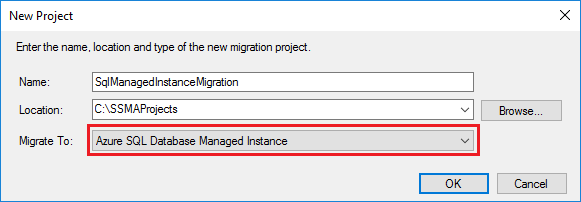
The SSMA for Oracle Extension Pack was also updated to allow remote installations on Azure SQL Managed Instance:
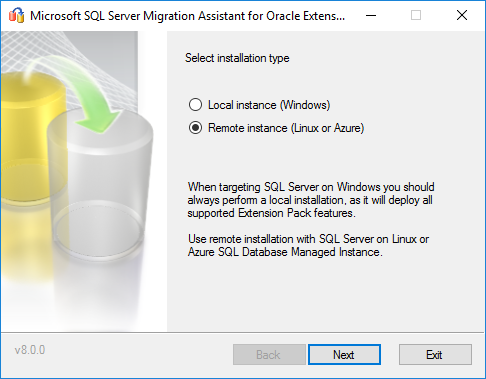
Some features, including Tester and Server-side data migration, aren't supported when targeting Azure SQL Managed Instance. Read more about it here.
Post-conversion Fix advisor. Learn more about it here.
Preliminary database/schema selection.
When you connect to the source, you can now select databases/schemas of interest. Selecting only the schemas that you plan to migrate saves time during initial connection and improve overall SSMA performance.
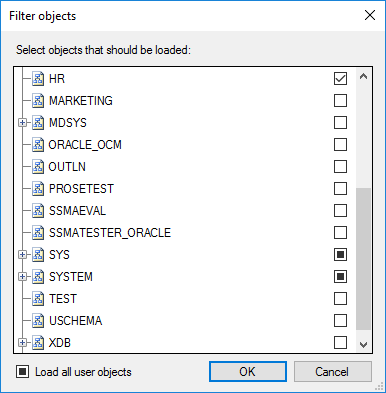
The ability to use the official, managed .NET driver to connect to Oracle. The OCI driver is no longer a prerequisite for using SQL Server Migration Assistant for Oracle.
The ability to map
ROWIDandUROWIDtoVARCHARby default. Changed fromuniqueidentifierto accommodate data migration for explicitROWIDcolumns.
SSMA v7.10
The v7.10 release of SSMA for Oracle contains the following changes:
- Targeted fixes designed to provide more security and privacy protections to meet changes in global requirements.
- A conversion improvement related to hierarchical queries.
SSMA v7.9
The v7.9 release of SSMA for Oracle contains the following changes:
- Targeted fixes that improve quality and conversion metrics.
- Support for migrating "Continue" statements from Oracle to SQL Server.
- Support in SSMA command line to alter Data Type mapping and Project Preferences.
- Support for migrating data using SQL Server Integration Services (SSIS). After converting the schema, it's possible to create an SSIS package by using a right-click context menu option.
- The Azure SQL Database connection dialog in SSMA has also been altered to specify the fully qualified server name. In previous versions of SSMA, the Azure SQL Database prefix had to be explicitly mentioned inside projects settings.
SSMA v7.8
The v7.8 release of SSMA for Oracle contains the following changes:
- Support for:
- Row expression for the
INclause. - Implicit type casts.
UIDconversion for Azure SQL Database.
- Row expression for the
- Change type mapping highlighted in Project Settings.
- The ability for users to disable telemetry.
SSMA v7.7
The v7.7 release of SSMA for Oracle contains the following changes:
- SSMA for Oracle has been enhanced with targeted fixes that improve quality and conversion metrics.
- Based on the popular demand, the 32-bit version of SSMA for Oracle is back. Compared to the previous implementation (before v7.4), there are two installer packages, but they can't be installed side by side. As a result, you must choose the most appropriate version based on the connectivity components you have. It's always preferable to use the 64-bit version, if possible.
- SQL Server 2017 support is now official with the Oracle Extension Pack supported on Linux as well (new remote installation option). Extension Pack functionality is limited when installed on Linux, as the tester and server-side data migration features aren't supported.
- SSMA for Oracle allows you to migrate Materialized Views as regular tables (configurable through the settings at Project Settings -> Synchronization -> Discover backing tables for Materialized Views).
SSMA v7.6
The v7.6 release of SSMA for Oracle is enhanced with targeted fixes that improve quality and conversion metrics and with support for SQL Server 2017 (public preview). Support for SQL Server 2017 on Windows and Linux is in public preview and shouldn't be used for production migrations.
SSMA v7.5
The v7.5 release of SSMA for Oracle contains the following changes:
- Enhanced with several improvements to ensure greater accessibility for people with disabilities.
- Updated to improve the quality and conversion metric with targeted fixes based on customer feedback, such as improved handling of date and float data types during data migration.
SSMA v7.4
The v7.4 release of SSMA for Oracle contains the following changes:
SSMA for Oracle now supports Azure Synapse Analytics as a target platform for migration.
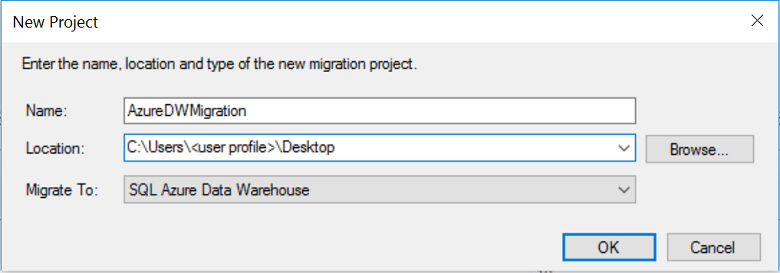
- Supports the Data Warehouse storage options as shown in the following image:

- Supports the data distribution options as shown in the following image:
The Query timeout option is now available during schema object discovery at source and target.
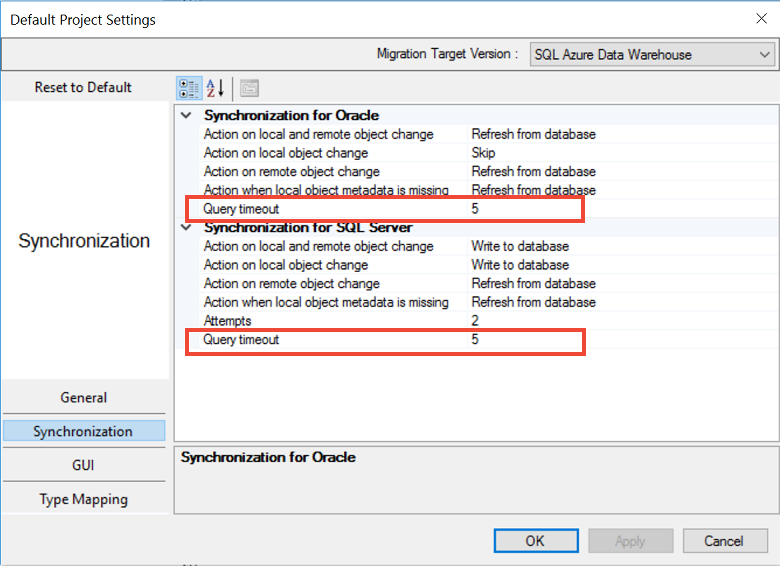
The quality and conversion metric has been improved with targeted fixes, based on customer feedback.
Important
.NET 4.5.2 is a prerequisite for installing SSMA v7.4. In addition, beginning with v7.4, the 32-bit version of SSMA is being discontinued.
SSMA v7.3
The v7.3 release of SSMA for Oracle contains the following changes:
- Improved quality and conversion metric with targeted fixes based on customer feedback.
- SSMA extensibility framework exposed via the following items:
- Export functionality to a SQL Server Data Tools (SSDT) project.
You can now export schema scripts from SSMA to an SSDT project. You can use the schema scripts to make additional schema changes and deploy your database.
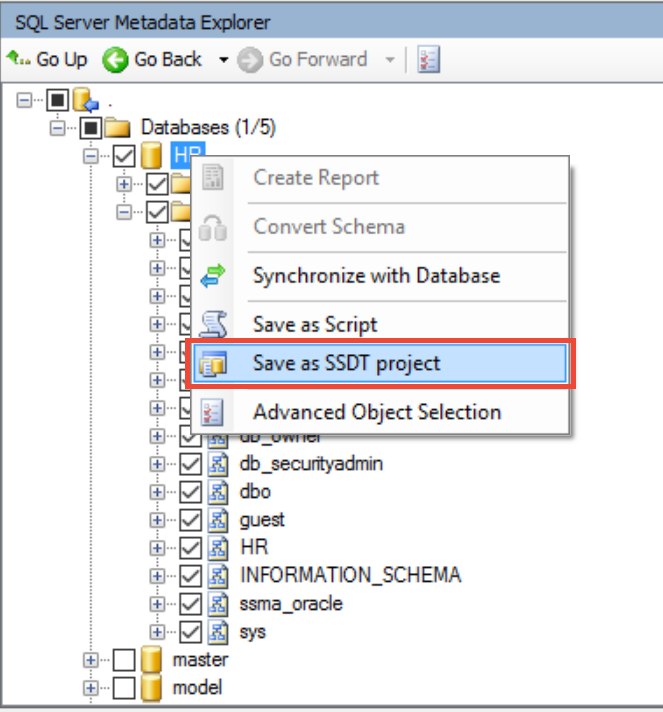
- Libraries that can be consumed by SSMA for performing custom conversions.
- You can now construct code that can handle custom syntax conversions and conversions that weren't previously handled by SSMA.
- Instructions on how to construct a custom converter are available in this blog post, Extending SQL Server Migration Assistant's conversion capabilities.
- Download a sample project for conversion from this blog post.
- You can now construct code that can handle custom syntax conversions and conversions that weren't previously handled by SSMA.
- Export functionality to a SQL Server Data Tools (SSDT) project.
SSMA v7.2
The v7.2 release of SSMA for Oracle contains the following changes:
- Improved quality and conversion metric with targeted fixes based on customer feedback.
- Telemetry enhancements to provide better data points to troubleshoot customer issues and improve SSMA's conversion rates.
SSMA v7.1
The v7.1 release of SSMA for Oracle contains the following changes:
- SQL Server 2017 on Windows and Linux CTP1 is now a supported target platform for migration. This feature is in technical preview and allows schema and data movement to target SQL Server instances.
- SSMA now supports automatic updates to download the latest version of SSMA as soon as it's available.
- SSMA installable binaries are now delivered through Windows Installer package files (.msi).
May 2016
The May 2016 release of SSMA for Oracle contains the following changes:
Added support for SQL Server 2016.
Added conversion of Oracle flashback archive tables to SQL Server temporal tables.
SSMA doesn't copy history data from Oracle Flashback Data Archive tables. As a result, the history data must be copied manually during the migration process. In addition, while SSMA doesn't display the history table in the SQL Server metadata explorer because it's treated as a system table, you can view the history table in SQL Server Management Studio.
SQL Server 2016 doesn't support several Oracle Flashback features, including:
- Oracle Flashback Transaction Query
DBMS_FLASHBACKPackage- Flashback Transaction
- Flashback Data Archive
- Flashback Table
- Flashback Drop
- Flashback Database
Added conversion of Oracle VPD Policy to SQL Server Policy objects (Row Level Security for Oracle).
Decreased time of initial loading for Oracle.
Improved parser and resolver.
Removed installer check for .NET 2.0.
Updated Extension Pack dependency from .NET 3.5 to .NET 4.0.
Fixed
save-projectandopen-projectcommands for SSMA Console.Fixed
securepasswordcommand for SSMA Console.Fixed counting of objects for initial loading.
Fixed converting of character data types for Oracle.
Fixed bug in Global Settings.
March 2016
The March 2016 preview release of SSMA for Oracle added support for:
- Migration to SQL Server 2016.
- Migrating Oracle Row Level Security (with some limitations).
- Migrating Oracle in memory tables to SQL Server columnstore.
January 2016
The January 2014 Maintenance release of SSMA for Oracle contains the following changes:
- Added support for Clustered Indexes.
- Fixed slow Oracle schema queries (RFC 5076207).
- Fixed connect to Azure from console.
- Added View Log Menu Item to SSMA (RFC 5706203).
- Added Telemetry.
July 2014
The July 2014 release of SSMA for Oracle contains the following changes:
- Added support for Azure SQL Database.
- Extension pack functionality moved to schema to support Azure SQL Database.
- Added support for Oracle Materialized views.
- Added support for SQL Server 2014 Memory optimized tables.
- Included performance improvements tested for databases with over 10k objects.
- Added UI improvements for dealing with large number of objects.
- Added highlighting of well-known LOB schemas.
- Included conversion speed improvements.
- Added support for showing object counts in UI.
- Reduced report size by more than 25%.
- Improved error messages for unparsed constructs.
April 2014
The April 2014 release of SSMA for Oracle contains the following changes:
- Added support of MS SQL Server 2014.
- Added support of Oracle 12 and query optimization.
- Fixed bugs regarding conversion to Azure.
- Fixed bugs regarding invisible report pages in IE 10.
January 2012
The January 2012 release of SSMA for Oracle adds support for RowType and RecordType input parameters defaulted to NULL.
July 2011
The July 2011 release of SSMA for Oracle contains the following changes:
- Added support for conversion of Oracle sequence to SQL Server 2012 (11.x) sequence generator.
- Improved error reporting during data migration.
- Improved conversion of statement using reserved words.
- Improved implicit conversion of date value in a function.
April 2011
The April 2011 release of SSMA for Oracle contains the following changes:
- Consolidated "SSMA for Oracle" product, which supports SQL Server 2005 (9.x), SQL Server 2008 (10.0.x) and SQL Server 2012 (11.x).
- Added support for connecting and migrating to SQL Server 2012 (11.x).
- Enhanced client-side data migration engine, supporting parallel migration of data.
- Improved data migration performance with
SimpleandBulklogged recovery models. - Added support for backward compatibility of projects created by earlier versions of SSMA (v4.0 and v4.2).
- Added the ability to install SSMA for Oracle v5.0 product side by side (SxS) with older versions of SSMA (v4.0 and v4.2).
- Added support for reporting User-Defined Types (includes subtype,
VARRAY,NESTED TABLE, object table, and object view) and their usages in PL/SQL blocks with special error messages.
July 2010
The July 2010 release of SSMA for Oracle added:
- Support for migrating to SQL Server 2008 R2.
- A new SSMA Console application for command-line execution.
- Support for Data Migration using both Server-Side and Client-Side Data Migration Engines.
- Support for "Custom SELECT" statement in data migration.
- Support for migrating from Oracle 11g R2.
June 2008
The June 2008 release of SSMA for Oracle contains the following changes:
- Added improvements to the Assessment Report, including additional information for synonyms, raw source for parsable objects, panels and SQL Server logo removal, and layout persistence.
- Added improvements in object conversion:
- Packages
DBMS_LOB,DBMS_SQLconversion added. - Joins conversion revised.
- Modification of collections and records conversion, now conversion of records in simple cases released via separate variables for each field.
- Improvements of records and collections implementation.
- Windowing aggregation functions added.
ROLLUP/CUBEclause added.- Improvement for
NEXTVAL/CURVAL. - Columns grouping in
SETclause, Grouping sets, and grouping ID were added. MERGEstatement added.- Support of new datetime types and conversion of records and collections as CLR data types added.
- Packages
- Added new features of Tester. Tables now can be tested as objects using Tester, a call order of several testable objects in test case can be altered, user can test procedures and functions with records and collections as parameters and return values, and a dependencies analyzer was added to check only used tables.
August 2007
The August 2007 release of SSMA for Oracle added:
- A new Tester component lets you create, manage, and run test cases to verify converted SQL code.
- Support for conversion of Oracle subtypes, collections, and local modules have been added to SQL converter.
- A new synchronization feature lets you synchronize specific objects with SQL Server database.
- New conversion options.
April 2007
The April 2007 release of SSMA for Oracle was the initial release.
